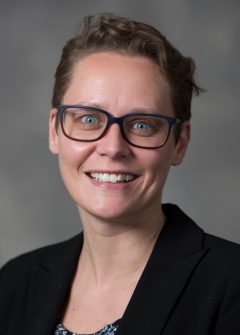Assistant Professor Katherine Reynolds, director of Elon Law's Humanitarian Immigration Law Clinic, spoke with journalist Bill O'Neil for a June 18, 2020, report on the U.S. Supreme Court's decision to preserve the Deferred Action for Childhood Arrivals program that the Trump Administration had attempted to end.

The director of Elon Law’s Humanitarian Immigration Law Clinic spoke with a North Carolina regional news station for a report on the DACA program created under President Barack Obama – and why the U.S. Supreme Court ruled that the Trump Administration had erred in an attempt to end it.
Assistant Professor Katherine Reynolds spoke with journalist Bill O’Neil about the ruling handed down on June 18, 2020, in which nearly 700,000 people covered under the Deferred Action for Childhood Arrivals immigration policy would no longer face the immediate prospect of deportation.
Meant to protect undocumented immigrants brought to the United States as children, DACA puts forward extensive criteria by which those immigrants would be able to stay in the country.
“When they say ‘we’re rescinding it’ and they fail to give a solid reason behind it, that’s where they messed up,” Reynolds said in her interview via Zoom. And though the Trump Administration can still decide to end the program by following the Administrative Procedure Act, “there’s no electoral reason to try to push for a recision of this program before November 3.”
Watch the full report: “‘Dreamers’ win Supreme Court victory over President Trumps plan to end DACA”
Before joining the Elon Law faculty, Reynolds was the Immigration Legal Services Program Coordinator at a refugee resettlement agency in Greensboro where she assisted refugees with adjustment of status and helped more than 150 lawful permanent residents to naturalize through a USCIS Citizenship and Integration Grant.
She was a supervising attorney at a refugee legal aid agency in Cairo, Egypt for three years, serving as director in her final year and managing an international staff of interpreters, attorneys, and volunteer legal advocates who provided assistance in obtaining UNHCR protection, refugee status, and resettlement for refugees and asylum-seekers from Sudan, Somalia, Ethiopia, Eritrea, Iraq, and Syria.


